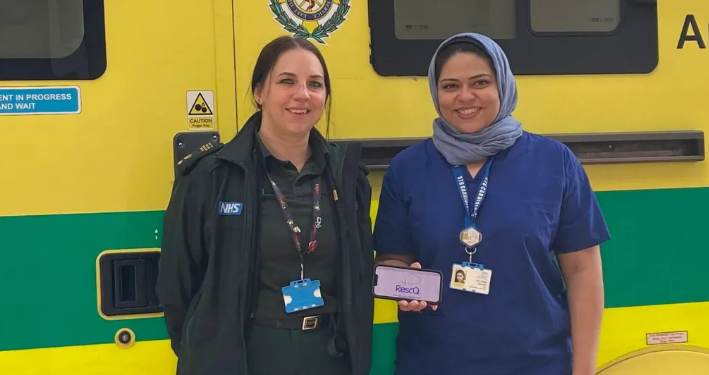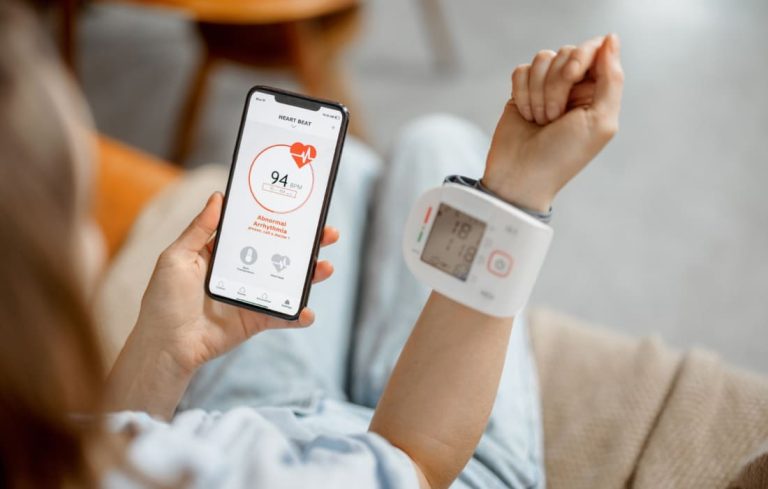Abstract
Cardiac arrest outside hospital settings remains a critical public health challenge, not only for patients but also for the individuals who witness these traumatic events. The newly introduced RescQ app is the first of its kind in the UK, developed to provide immediate informational and emotional support to bystanders, family members, and friends during such emergencies. Piloted in Essex, this initiative is poised to address the psychological aftermath experienced by so-called “forgotten patients.” This article outlines the app’s development, early findings from clinical trials, and its potential implications for broader implementation and public health policy.
Introduction
Out-of-hospital cardiac arrest (OHCA) is a sudden, life-threatening event that affects thousands of individuals each year in the UK. Witnesses to these emergencies—often family, friends, or even strangers—experience severe emotional distress that can lead to long-term psychological issues, including symptoms of post-traumatic stress disorder (PTSD) . Traditionally, interventions have focused on the victim; however, growing awareness of the burden on witnesses has spurred the development of targeted support measures. In this context, the RescQ app represents a pioneering strategy aimed at bridging the gap in post-incident care for those indirectly affected by OHCA.
Background and Rationale
The need for specialized support for witnesses has been underscored by research from both the British Heart Foundation and various healthcare institutions. These studies indicate that individuals who experience the shock of witnessing a cardiac arrest often have limited access to immediate psychological support and guidance . Recognizing a critical gap in the continuum of emergency care, medical experts have begun advocating for the integration of mental health resources within the emergency response framework. The RescQ app is a direct response to this unmet need, with its foundation based on evidence that timely emotional support can mitigate the lasting impact of traumatic medical events.
Materials and Methods
App Overview
The RescQ app is developed as a mobile platform designed to:
- Inform: Provide clear, concise information about what to expect after witnessing an OHCA.
- Support: Offer multimedia guidance including videos featuring real-life experiences, insights from psychologists, and advice from medical professionals.
- Connect: Allow individuals to request further assistance in the form of consultations with trained patient liaison officers if needed.
Pilot Study Setting
The app is currently being piloted in Essex over a one-year period. During this initial trial phase, the app has already been integrated into the workflow of first response teams, including those from the East of England Ambulance Service Trust (EEAST) and partner organizations such as Essex & Hertfordshire Air Ambulance and Sudden Cardiac Arrest UK. In its first week alone, the app facilitated support for 22 bystanders during 18 reported OHCA events. For context, the Mid and South Essex NHS Foundation Trust notes that this region experiences approximately 3,500 OHCAs per year .
Results
Early Observations
- Incident Reporting: In the initial phase of the pilot, ambulance crews used the RescQ app not only to document the details of each OHCA event—including the number of witnesses—but also to initiate early support measures.
- User Engagement: The app’s interface presents an accessible and user-friendly design, featuring video testimonials and expert insights aimed at helping users understand and cope with the shock of witnessing a cardiac arrest.
- Emotional Relief: Preliminary data from the first week indicate that support was extended to 22 bystanders, suggesting that targeted digital interventions can quickly address a previously overlooked aspect of emergency care.
Discussion
Addressing Emotional Aftermath
The introduction of the RescQ app reflects an innovative shift toward recognizing and treating the psychological impacts on those who witness critical health emergencies. Dr. Uzma Sajjad, a cardiology research fellow at the Essex Cardiothoracic Centre, emphasized the scarcity of resources addressing the emotional toll on bystanders, referring to them as “forgotten patients” . With support materials curated through an interactive website—complete with guidance from mental health professionals—the app helps demystify the emotional process following an OHCA.
Multi-Stakeholder Collaboration
By collaborating with key regional agencies such as the East of England Ambulance Service Trust and various air ambulance services, the program ensures that the RescQ app is grounded in real-world emergency response contexts. This integrated model, which collects data and feedback from users, reinforces continuous improvements in digital health interventions. Studies from international counterparts, including guidelines by the American Heart Association, support a similar emphasis on multi-disciplinary support post-cardiac events .
Future Directions
With the pilot scheduled to run until early 2026, the next step will be evaluating long-term outcomes and exploring the feasibility of broader geographic implementation across Norfolk, Hertfordshire, and beyond. Future iterations may incorporate enhanced analytics to personalize support strategies based on user feedback and evolving clinical insights. Researchers and policymakers alike are watching the progress of such initiatives, which could reshape how emergency mental health support is integrated into broader healthcare services.
Conclusion
The RescQ app marks a significant innovation in the realm of emergency care by extending support to those who bear witness to out-of-hospital cardiac arrests. Early trial data from Essex suggest that timely digital interventions can play a crucial role in alleviating the psychological burden on bystanders—effectively addressing a previously neglected facet of emergency response. As the pilot study continues, its findings are expected to inform best practices and influence policy development, ensuring that support for “forgotten patients” becomes an integral component of modern healthcare systems.
For more information, please contact the Essex Cardiothoracic Centre (CTC)










